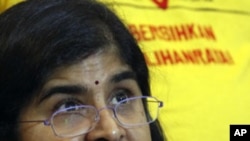The organizers of Saturday’s massive demonstration in Malaysia, the largest such protest criticizing the government in years, are demanding authorities release six people still in detention and respond to their list of grievances. Organizers are not planning more street protests at this time.
The fallout from the Bersih electoral reform rallies which attracted tens of thousands of people onto the streets of the capital has not diminished, with the government defending the actions of its police force and arguing the movement does not enjoy any popular support.
Lawyer Ambiga Sreenevasan, who is president of the Coalition for Clean and Fair Elections which organized the Bersih rallies, says there is no need for more rallies until authorities address their concerns about improving electoral transparency.
“One, is the cleaning up of the electoral roles," she said. "We've had many reports of phantom voters. We have also asked for the use of indelible ink. We have also asked for free and fair access of media to all parties. We've also asked for enforcement, I mean our institutions to be free of corruption and to act against corruption in the elections.”
The government insists its current electoral policies are already free and fair, but Bersih organizers say they want an independent assessment of the entire process.
Sreenevasan says an independent inquiry known locally as a royal commission, would go a long way in curbing electoral fraud, even if the terms for such an inquiry are set by the current Prime Minister Najib Razak, whose United Malays National Organization has ruled this country for 54 years.
“Of course it's the prime minister who asks for a royal commission, for the king to make that appointment and the terms of reference are set out by the government. So we know that what we're doing is asking the government to set up a royal commission. Now when we say royal commission here what we're asking for is the royal commission to look into the entire electoral system and to make recommendations for its improvement,” she said.
Sreenevasan says the Coalition for Free and Fair Elections and Bersih, which means clean in Malay, were not part of the political opposition in Malaysia and she declined to comment on the potential outcome of the next election. That election must be held by 2013, although speculation has intensified that the prime minister will call an early poll for later this year or early next.
“If the government is wise they will actually respond positively to the wishes of the people rather than to continue to demonize them and unfortunately as of today they are continuing to demonize Bersih rather than looking at it as peaceful citizens of Malaysia wanting to have their voices heard,” said Sreenevasan.
Malaysian authorities had declared Saturday’s protest illegal before it even began, saying it was a threat to national security and aimed at toppling the government. A U.N. human rights official later said there was no credible evidence to support the claim.
The United Nations, Amnesty International and Human Rights Watch have all rebuked this country for heavy handed police tactics employed against the protesters. Bersih organizers want the Malaysian human rights commission to investigate police actions that they say included baton charges, beatings and tear gassing of protesters.
The Malaysian government says the violent portrayal of the protests had more to do with biases in the international media than police action on the ground. Authorities backed the actions of security forces, saying they ensured that peace was maintained.
Malaysian Electoral Reformers Plan Next Steps After Protest Crackdown




